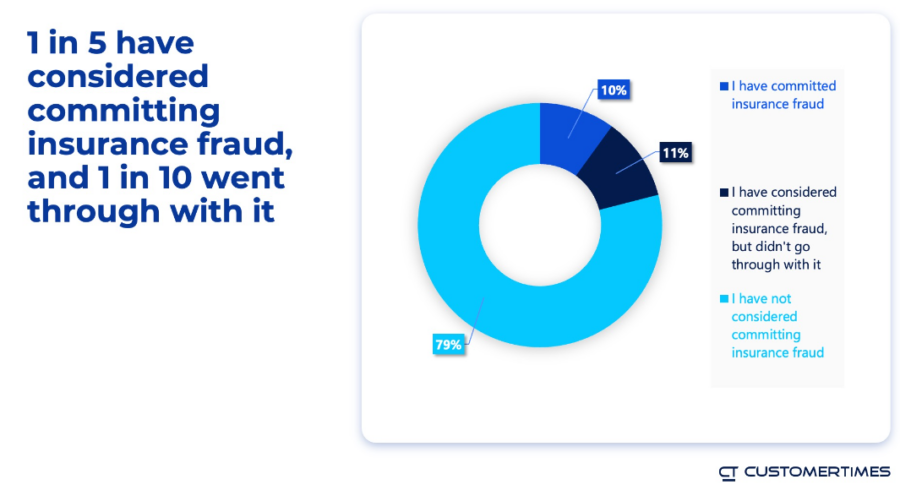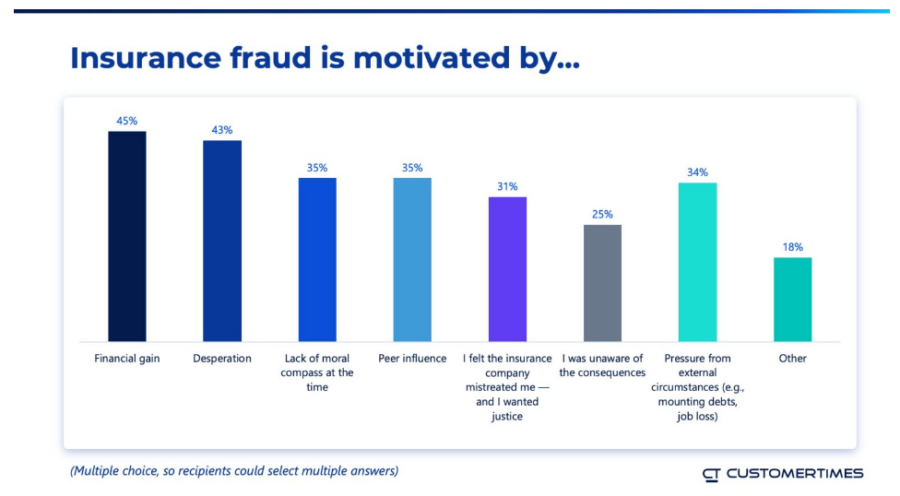1 in 5 in study admit to considering insurance fraud

Insurance fraud is a pervasive issue in the U.S., with estimates suggesting it could cost the industry more $300 billion annually. But beyond the financial strain on insurers, it impacts consumers directly, leading to higher premiums and a sense of injustice among honest policyholders.
To delve deeper into this phenomenon, Customertimes conducted a survey of 2,000 Americans, shedding light on the prevalence of fraudulent claims and the underlying motivations driving them.
The findings reveal a concerning reality: one in five respondents admitted to at least considering committing insurance fraud, with 10% admitting to following through with their plans. Moreover, a significant portion of the surveyed population knew individuals who had either committed or contemplated insurance fraud.
The conclusions jibed with similar findings released last month by the Coalition Against Insurance Fraud, an organization of consumers, insurers, government agencies, prosecutors and others, all uniting to fight fraud.
“Consumer attitudes towards insurance fraud are concerning,” said Michelle Rafeld executive director of the coalition. “Studies show a significant portion of the population does not view it as a crime.”
Rafeld said that the same technology advancements that have made it easier for individuals to get their insurance, have also made it easier for sophisticated criminals to commit insurance fraud.
In the Customertimes survey, financial gain unsurprisingly emerged as the primary motivator for insurance fraud, cited by 45% of respondents. However, non-financial factors also played significant roles, including peer influence, a desire to address perceived injustices by insurers, ignorance of consequences, and desperation.
The study also highlighted consumers' perspectives on the role of policy loopholes and perceived unfairness in driving insurance fraud. Nearly half of Americans believed that loopholes in policies facilitated fraudulent activities, while a quarter considered insurance fraud justifiable when policies were deemed unfair. This subjective interpretation of fairness poses a challenge for insurers in crafting policies that are perceived as equitable by all parties involved.
Interestingly, consumers tended to view fraud committed by individuals as less serious than corporate fraud. While many expressed confidence in their ability to identify fraudulent cases, there was skepticism regarding insurers' capabilities in detecting and preventing fraud consistently.
Looking ahead, consumers expressed optimism about the potential of new technologies such as AI and data analytics to enhance fraud detection efforts. However, they also emphasized the need for insurers to prioritize consumer education and streamline communication processes. A majority felt that insurers were not doing enough to inform consumers about fraud prevention measures or adequately compensate fraud victims.
Moreover, consumers signaled a willingness to share more data if it contributed to fraud prevention efforts, underscoring the importance of transparency and collaboration between insurers and policyholders. Simplifying bureaucratic procedures and enhancing user experience emerged as key factors in building consumer trust and bolstering fraud prevention initiatives.
“If providers needed an additional incentive to improve the user experience, they should note that 80% of respondents said they would be more likely to trust insurance companies if they were less bureaucratic to deal with,” said Drew Sickler, VP salesforce for Customertimes. “If insurers can give consumers more confidence in their processes, then it could help provide valuable intelligence in preventing the scourge of insurance fraud.”
Addressing that scourge, he said, requires a multifaceted approach that encompasses consumer education, technological innovation, and a commitment to fairness and transparency within the industry.
“By heeding the insights gleaned from this study, insurers can take proactive steps to mitigate fraud risks and foster greater trust and accountability among all stakeholders involved in the insurance ecosystem,” he said.
Doug Bailey is a journalist and freelance writer who lives outside of Boston. He can be reached at [email protected].
© Entire contents copyright 2024 by InsuranceNewsNet.com Inc. All rights reserved. No part of this article may be reprinted without the expressed written consent from InsuranceNewsNet.com.
Doug Bailey is a journalist and freelance writer who lives outside of Boston. He can be reached at [email protected].







IRS again defers minimum distribution penalty for IRA beneficiaries
Revol One Financial retools with new annuity products, big goals
Advisor News
- Bill that could expand access to annuities headed to the House
- Private equity, crypto and the risks retirees can’t ignore
- Will Trump accounts lead to a financial boon? Experts differ on impact
- Helping clients up the impact of their charitable giving with a DAF
- 3 tax planning strategies under One Big Beautiful Bill
More Advisor NewsAnnuity News
- An Application for the Trademark “EMPOWER INVESTMENTS” Has Been Filed by Great-West Life & Annuity Insurance Company: Great-West Life & Annuity Insurance Company
- Bill that could expand access to annuities headed to the House
- LTC annuities and minimizing opportunity cost
- Venerable Announces Head of Flow Reinsurance
- 3 tax planning strategies under One Big Beautiful Bill
More Annuity NewsHealth/Employee Benefits News
Life Insurance News
- On the Move: Dec. 4, 2025
- Judge approves PHL Variable plan; could reduce benefits by up to $4.1B
- Seritage Growth Properties Makes $20 Million Loan Prepayment
- AM Best Revises Outlooks to Negative for Kansas City Life Insurance Company; Downgrades Credit Ratings of Grange Life Insurance Company; Revises Issuer Credit Rating Outlook to Negative for Old American Insurance Company
- AM Best Affirms Credit Ratings of Bao Minh Insurance Corporation
More Life Insurance News